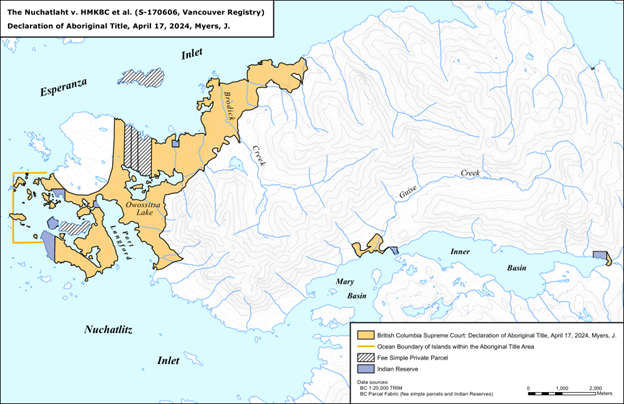- with Inhouse Counsel
- with readers working within the Healthcare and Law Firm industries
The Nuchatlaht have recently appealed the trial decision in their Aboriginal title case. In April 2024, the Nuchatlaht were granted title to roughly 11 square kilometres on the northwestern part of Nootka Island (The Nuchatlaht v. British Columbia, 2024 BCSC 628). The Nuchatlaht had claimed a much larger area totalling roughly 201 square kilometres. In their appeal, the Nuchatlaht seek a declaration of Aboriginal title with respect to the entire claimed area.
The Claim was Constructed for an Expedient Trial
The scope of the Nuchatlaht's claim was narrow, in that it did not include title to the foreshore or seabed, excluded title to lands held in fee simple, and did not include claims for Aboriginal rights. However, the Nuchatlaht's claim was comparatively extensive, in that it included over 201 square kilometres. As a result of a number of strategic decisions (including the narrowing just noted), this trial was much shorter than other Aboriginal title and rights litigation. The 54-day trial did not include oral history evidence. Instead, the Nuchatlaht and BC relied exclusively on expert evidence. For comparison, the trial in Tsilhqot'in took place across 339 days over a span of five years and another recent Aboriginal title case involving Cowichan Tribes has had over 450 days of evidence alone.
Initially the court refused to issue a declaration of Aboriginal title (The Nuchatlaht v. British Columbia, 2023 BCSC 804) because there was not enough evidence to satisfy the legal test for Aboriginal title over the entire claim area. Evidence that was accepted by the court related to occupation of coastal lands while a significant portion of the territory claimed was inland. However, rather than dismissing the entire claim, the court invited the Nuchatlaht to advance a claim with respect to smaller portions of the area claimed at a further hearing. That hearing took place in March 2024. At that hearing, the Nuchatlaht continued to seek declarations with respect to their broader asserted territory, albeit comprised of smaller portions. In April, the court held that Aboriginal title had been proven over 11 km2 – as shown on the map below.

The Nuchatlaht Contrast the Province's Approach in their Case with Province's Agreement with the Haida Nation
Publicly, the Nuchatlaht have noted apparent inconsistency in the Province's recent approach to Aboriginal title in the Gaayhllxid/Gíihlagalgang "Rising Tide" Haida Title Lands Agreement. In the Nuchatlaht trial, the Province argued a lack of evidence regarding occupation of inland mountains and forests. In contrast, the Province's agreement with the Haida Nation (which includes a recognition of the Haida Nation's Aboriginal title) covers territories that it says are analogous to those involved in its claim. You can read our bulletin on that agreement here.
Complexity of Aboriginal Title Litigation Persists Despite Narrow Scope of Claim
The Nuchatlaht's trial makes clear that Indigenous groups continue to face evidentiary hurdles in the pursuit of Aboriginal title claims. Compelling expert evidence plays an important role in these claims. However, the decision in this case underscores that courts must be presented with evidence of occupation across the territories claimed.
In its trial judgment, the court noted that appellate courts may need to reconsider the test for Aboriginal title with respect to coastal First Nations. The court acknowledged the Nuchatlaht's argument that an area should be awarded based on watershed areas (an argument they based on international law). The court found this principle to be inapplicable as the law presently stands, but again signalled that appellate courts may consider this factor and adjust the test for Aboriginal title.
Continue watching this case to see whether these or other novel questions are taken up on appeal.
The content of this article is intended to provide a general guide to the subject matter. Specialist advice should be sought about your specific circumstances.




